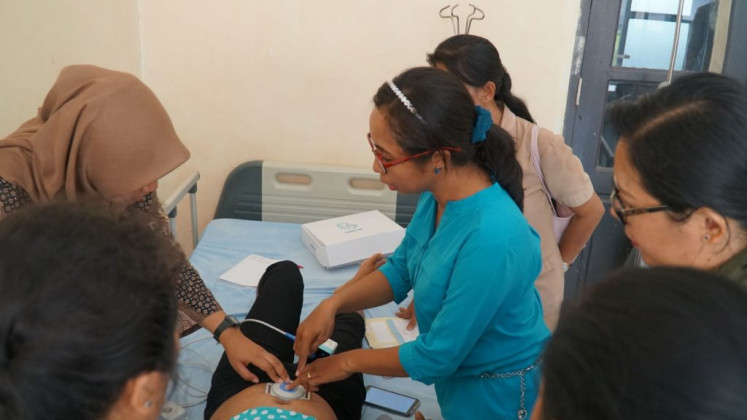Popular Reads
Top Results
Can't find what you're looking for?
View all search resultsPopular Reads
Top Results
Can't find what you're looking for?
View all search resultsIslamic housing, a divisive business idea
Creating faith-based housing areas must be among the worst imaginable business ideas.
Change text size
Gift Premium Articles
to Anyone
A
s red and white adornes streets, buildings and residential areas ahead of Independence Day, Indonesians are gearing up for games, barbecues, parades and bazaars with higher spirits from our hosting the Asian Games.
Amid this exuberant display of communal patriotism, however, we are seeing the rise of religiously segregated residential areas as developers target the growing Muslim market. They’re not new, but they shouldn’t be “booming”, as The Jakarta Post recently reported.
Among the first brilliant ideas targeting Muslim consumers was Sunsilk’s shampoo for veiled women that claimed to keep your head feeling fresh in the heat, even when covered. Long before other brands caught up, its unique commercial showed a model swishing her lime-green hijab to and fro.
The marketing was a shrewd response to the physical and spiritual needs of the growing number of “hijabers” who have now become mainstream, and include the many businesswomen shaping Indonesia’s famed Islamic fashion industry.
Other products catering to Muslim needs are sharia banking and sukuk bonds. Like halal foods and alcohol-free cosmetics, these products are not exclusive to Muslims. A friend who is not Muslim says his wife prefers a hospital run by an Islamic foundation, as the nurse will always say Bismillah (In the name of God) before giving injections, which she finds calming.
Now there’s Islamic housing, which should be attractive for its claim to be funded only by Islamic banks, suggesting mortgage payers would experience less stress with no sudden interest rate hikes.
The National Consumer Protection Agency (BPKN) said that between January and June, more than 85 percent of 241 complaints were related to private property transactions. Surely “Islamic housing” would protect consumers from unscrupulous developers?
Alas, these residential areas are exclusively for Muslims. And that’s where Indonesian citizens, Muslims or not, should draw the line.
The Post’s July 28 report said several property developers were catering to a promising Muslim market on the back of the National Islamic Finance Committee promoting sharia-compliant businesses, including manufacturing, tourism and property.
As members of the majority faith, Muslim businesspeople should indeed unleash their creativity to provide alternative products and services in keeping with their beliefs.
But developing exclusive faith-based residential areas and choosing to live in them worsens segregation in our not-so-harmonious society. It does nothing to improve relations among human beings, as Islam and other faiths surely instruct, but has the potential to urge the opposite.
Over the past decades, the number of religious schools has increased. As good public schools became harder to access from tight competition, parents who didn’t want their children to attend religious schools had fewer options for decent, affordable, secular private schools.
Education has thus come to contribute greatly to increasing segregation.
What should be better enforced is the inclusive housing regulation that mixes elite and low-cost options.
The May 1998 riots should have been enough for us to pledge, “Never again”. The perceived exclusivity of the Chinese-Indonesian minority was blown up by anti-rich and anti-non-Muslim sentiments. Since then, iron bars and gates have remained in residential complexes as reminders of the “security measures” neighborhoods adopted against race- and faith-fueled violence.
But despite the trauma, we have not learned the lesson: to reduce inequality as one factor that incites unrest. Those high walls and fences are still standing.
Thus, creating faith-based housing areas must be among the worst imaginable business ideas. Surely, the brilliant minds among investors and architects could use their talents and resources for something more useful than such obvious projects for profit, just because we have more affluent Muslims today.
Granted, the concept of an Islamic residential area is appealing. Nervous Muslims need not worry about coming across their friendly neighbors’ dogs, even when one simply needs to wash off the najis (unclean) saliva. The developer would be more mindful of residents’ needs for mosques near their homes.
But life in Indonesia should not allow for such options. Being Indonesian means learning to live with our pluralism, for us and for our children, so our grandchildren can do better.
As for now minorities still cope silently with the loudspeakers of local mosques, when even appeals from the Indonesian Mosques Council (DMI) to reduce “air time” continue to be ignored.
Today’s main fear is not “Christianization”, as some Muslims insist. Instead, it is the diminishing will to nurture our national motto, Bhinneka Tunggal Ika(Unity in Diversity), and the dwindling common sense in the face of the latest celebrity preacher on YouTube.
Any Muslims who feel distressed about threats to their faith — whether perceived, imagined or real — could try living in sharia-ruled Aceh or nearby Islamic states like Brunei or Malaysia. Or are they lured by developers pitching something like, “Find syar’i [in accordance with sharia] living at our property”?
Marketing an “Islamic residential complex” loaded with images of getting closer to heaven is an easy cop-out. At the same time, it only tightens the social bubble many of us already live in, and leads Muslims farther from the virtuous struggle they are supposed to pursue.
So Pak Ma’ruf Amin — the powerful head of the Indonesian Ulema Council (MUI) and a sharia economics expert who was recently nominated the incumbent’s running mate for 2019 — please don’t encourage expanding the sharia economy through potentially divisive businesses.
Even without a ban on religiously segregated housing, people of the same faith dominate some elite complexes in our cities. Getting along with neighbors is hard enough, amid their envious renovations or annoying kids and cats. Nevertheless, most neighbors generally show spontaneous empathy when someone experiences a misfortune, and help each other’s family celebrations.
More religiosity among Indonesians should also mean more citizens improving neighborly relations,
On Independence Day of Aug. 17 I wish I could just relax, but my name is already in one of the teams joining the nasi goreng (fried rice) cooking contest. So I suppose I should do my bit for Hari Merdeka.
Apparently our very ordinary neighborhoods are national assets. So let’s promote mixed residential areas that are representative of the melting pot that is Indonesia, where I can enjoy my neighbors’ melodious hymns. Alhamdulillah.
***
The writer is a journalist at The Jakarta Post.











